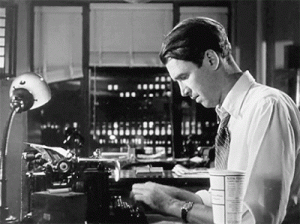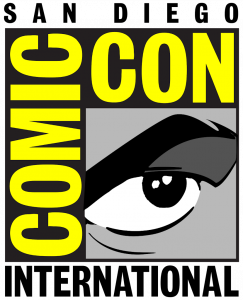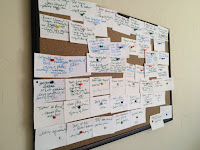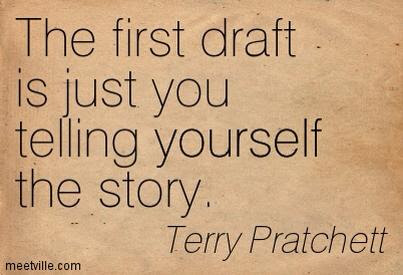I’d planned a horror genre post for last week, but it never came together in a way I was really happy with. And one of the changes I’m trying to make here is not to force myself to come up with blog posts. Or to spend hours and hours trying to make them work—which, y’know then puts me hours behind in the work I actually get paid for.
On a related note, please don’t let this stop you from asking or suggesting something down in the comments. I’m always up for answering questions—that’s easy. It’s trying to come up with semi-relevant topics that’s always the tough part.
But anyway… now it’s November, and November only means one thing…
Turkey and stuffing!!!
No, wait it means
Na No Wri Mo !!!
(shouted like the opening to “Mortal Kombat”)
It’s National Novel Writing Month, and you may be one of the thousands of folks who sat down yesterday (or late Tuesday night) and started working on a book. If you are, I’d like to offer you four big tips for NaNoWriMo. I’ve presented these in the past, and I think they’re key to having a successful, productive November. Or any month, really, if you’re not trying to finish a book in the next thirty days…
So here’s four things we all should keep in mind
1) Pace Yourself—Trying to fill every waking moment of the month with writing will burn any of us out pretty quick. Seriously. And it’ll show in the work. Don’t believe all those bozos telling you that desperation and misery creates greatness. Nobody wins a marathon by sprinting the entire way.
It’s tough, but try to be aware of diminishing returns. A lot of times—especially when I’m on a deadline—I’ll work late into the night. Sometimes it goes great, but sometimes… I start to slow down and my productivity drops. Eventually it hits a point where I would’ve been better off going to bed two or three hours ago because I would’ve gotten just as much done in half an hour on a good night’s sleep.
Again, none of us can sprint for a month. And after too many sprints, you’re just going to crash. Hard. So find a good, steady pace that works for you and keep it up. Remember, the idea here is we’re not trying to write faster, we’re trying to write at a much more regular rate. It’s better to do a thousand word every day than two thousand every third or fourth day. Or six thousand a day for two weeks and then quitting because we’re burned out.
2) Rest and recharge—Don’t be scared to not write for a little while. Have a meal at the table. Curl up with somebody on the couch for half an hour and get caught up on Loki or listen to an episode of Old Gods of Appalachia or something. Go for a walk. Run an errand. Take a nap. Take a shower. No, seriously, take a shower. Yeah, I’m talking to you. You’ve been sitting there typing since midnight Tuesday and you’ve got Halloween stink and writer stink on you. Please use body wash.

The point is, don’t feel bad about stepping away from the computer for an hour. We’re trying to get a lot done this month, yeah, but we also don’t want to overwork our brains to the point they overheat and seize up (see above—crashing and burning). Take time to cool down and refuel. I’m not saying take off two or three days, but don’t be scared to get up and stretch now and then. In the end, it’ll make everything run smoother and overall faster.
3) Don’t be Hard on Yourself—NaNoWriMo is work, but it’s also supposed to be kind of fun. We’re on a deadline, sure, but it’s a self-imposed deadline with no consequences if it’s missed. Seriously, none. Working on my book shouldn’t make me feel miserable (again, see above—bozos).
So relax. Push yourself, but don’t pressure yourself. The real goal here is to improve, to increase my regular writing rate. Any and every improvement counts. Don’t beat yourself up if you don’t make your targeted daily or weekly word count. That’s the kind of thing that only makes you feel bad about yourself. It doesn’t help anything, it just makes you not enjoy writing as much. Enjoy all the little victories this month. This is a time when coming in second or third is still a great achievement.
4) Nobody’s Going to Buy This— Sorry to sound harsh, but forget that right now. Seriously, it’s just not going to happen. No agent’s going to look at this. No film studio will pre-emptively buy the rights after a prolonged bidding war. We’re just not there yet. Nowhere near it.
Y’see, Timmy, National Novel Writing Month is kind of deceptive, because we’re not really going to be writing a novel this month. We’re writing the first draft of a novel. Just a first draft. Maybe even just the first draft of a novella. And, as we’ve discussed here a few times, there’s a big difference between a first draft and a polished, completed manuscript.
And really, we’re writing a rushed first draft. It’s going to have plot holes and dropped threads and factual errors and punctuation mistakes and typos. Sooo many typos. Incredibly embarrassing ones. It absolutely will, trust me. Having a finished first draft is a fantastic starting point, but it’s going to need a lot more work once November’s over. No question about it.
This draft is for us. It’s to do whatever we want with. Don’t spend a moment second-guessing what those other people will want. They’re never going to see this. They may see the third or fourth draft later—and be interested in it—but what we’re doing right now? This is just the first steps. When we complete this draft, we’ll barely be halfway through the process.
So forget everyone else. For NaNoWriMo, just crank up the music and let your imagination run wild. Do whatever you want. Drop your inhibitions and expectations and just tell your story.
Try to keep these things in mind over the next couple weeks. Hopefully they’ll make things a little easier for you. Which’ll make the writing a little more enjoyable.
Next time… maybe I’ll finally talk about Rashomon. Or maybe I’ll answer one of your questions.
Until then… go write.







